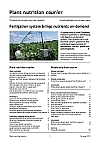E-mail Newsletter August 2014
This e-mail newsletter is the notification of the Juni 2014 issue that has recently been published. The August 2014 issue will follow shortly afterwards.

 Potassium accumulation as insurance strategy
Potassium accumulation as insurance strategy
Crops can take up far more potassium than required for growth and development. German plant nutrition scientists consider this accumulation as an insurance strategy to survive sudden stress situations and not as luxury consumption. Read more in the recently published June 2014 issue of the Plant nutrition courier.
 Boron phosphate is crop-safe slow-release fertiliser
Boron phosphate is crop-safe slow-release fertiliser
Boron phosphate synthesized at high temperatures has low water solubility. Co-granulated with monoammonium phosphate, this novel boron fertiliser slowly and continuously release over time, according to Australian researchers. Picture: University of Adelaide.
 Pear better storable after high calcium dose
Pear better storable after high calcium dose
A high dose of calcium chloride just one week before pear picking significantly improves fruit storability. This preharvest treatment also reduces internal browning, according to Polish research pomologists. In apple, a high preharvest dose of calcium chloride yielded contradictionary results.
 Engineers use LEGO bricks to study plant growth
Engineers use LEGO bricks to study plant growth
Iowa State University engineers use transparent LEGO bricks to build controlled environments to study how variations in climate and soil affect plant growth. They developed techniques to create controlled chemical gradients in the LEGO environments with the intent of testing plant response to nutrients and toxins. Picture: Iowa State University.
 Selenium enhances purple potato yield
Selenium enhances purple potato yield
Sodium selenite application increases tuber number of purple potato, but inhibits tuber expansion. On balance, selenium enhances the yield of purple potato, say Chinese researchers.
More about potato nutrition
● Splitting phosphorus application may increase potato yield
● Nitrogen forms affect stolon and tuber growth
 New plant, soil and fertiliser tests
New plant, soil and fertiliser tests
● Early detection of nitrogen deficiency by artificial vision techniques
● Visualisation of phosphorus diffusion from fertiliser
● Test kit for zinc content in fertiliser
 And further
And further
● Call for reply to ‘potassium paradox’ paper
● Plant growth regulators increase potassium uptake
● Experimental zinc phosphate fertiliser
● Clay coating for slow release fertiliser (see picture, Lanzhou University)
● Tripotassium phosphate induces wheat aphid tolerance
● High nitrogen level needed for gray mold biocontrol in tomato
● Effective microorganisms promote tomato pest
● Extra nitrate and growth promotion with cold plasma water treatment
● Ammonium in rhizosphere improves iron status
● Gibberellin alleviates manganese antagonism to glyphosate
● Borax and thiourea deactivate germination stimulants for
● parasitic weeds
● Strontium biofortification for bone health
 Single issue
Single issue
Click here for a single issue of the Plant nutrition courier.
News at Plant nutrition courier website
Click here for free plant nutrition related news.
Click here for free agronomic news.
Information about Plant nutrition courier
Subscription
Plant nutrition courier
Please let us know if you are not interested in news about plant nutrition.